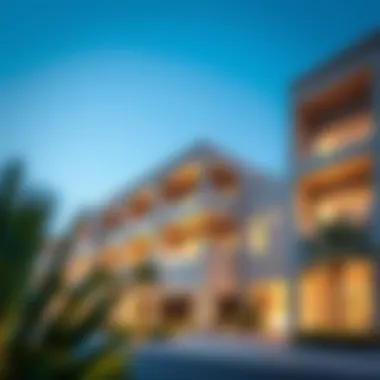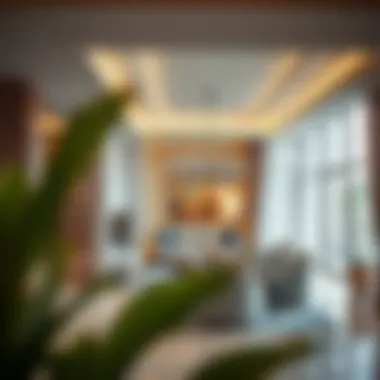Al Hamra Real Estate Development: Impact on Dubai


Intro
Al Hamra Real Estate Development has gradually become a key player in shaping the vibrant landscape of Dubai's real estate market. With a slew of projects that not only focus on luxury but also emphasize sustainability, their influence stretches far beyond mere property development. As we peel back the layers of their operations, we uncover the driving forces behind their success, their strategic approach to market trends, and the vital role they play in community development.
Investors and homebuyers alike are keen on understanding how Al Hamra's initiatives can affect their decisions in an ever-complicated market. This analysis goes beyond the surface. It scrutinizes their projects, sustainability pursuits, market positioning, and forecasts for the future. By engaging with this content, readers will grasp a nuanced understanding of how Al Hamra significantly contributes to the real estate dynamic in Dubai.
Market Trends
Current Market Overview
In the ever-evolving landscape of Dubai’s real estate, Al Hamra stands tall, blending modernity with tradition. As the city continues its relentless march towards grandeur, the demand for diverse property options, ranging from residential to commercial, remains robust. Property prices in Dubai have shown a fluctuating trend over the past few years. Yet, the demand for quality developments like those from Al Hamra has remained stable.
New housing projects, combined with government initiatives aimed at boosting economic activity, have drawn both local and global investors. Al Hamra’s projects are often at the forefront, showcasing innovative designs and amenities catering to a modern lifestyle – a combination that continuously piques the interest of potential buyers.
Future Predictions and Opportunities
Looking ahead, market analysts are optimistic about Dubai's real estate sector. With events like Expo 2020 still serving as a launching pad for investment, the outlook appears promising. Al Hamra's focus on sustainability and eco-friendly practices aligns well with the growing preference among buyers for green living spaces. This trend is likely to unfold into a significant opportunity for the company, as more buyers become conscientious of their choices.
Here are some predicted trends:
- Increased Demand for Sustainability: With climate change being a pressing issue, properties that prioritize sustainable building practices and energy efficiency are expected to see a surge in demand.
- Smart Living: Integration of technology in home design, enhancing convenience and security, will likely capture the interest of tech-savvy buyers.
- Community-Oriented Developments: Projects that foster a sense of community may become more popular, reflecting buyers' desires for lifestyle-focused living.
"To understand the future of real estate, one must first recognize the patterns laid by past developments and trends."
As the trends evolve, potential investors and homebuyers must navigate through careful consideration of their choices.
Investment Strategies
Tips for Savvy Investors
For those keen on investing in Al Hamra properties, it's important to grasp a few strategies:
- Understand Market Dynamics: Keep an eye on Dubai's real estate indicators, such as price trends, rental yields, and demographic shifts.
- Focus on Emerging Areas: Consider properties in up-and-coming districts where substantial development plans are underway. These areas often provide better return rates.
- Build Relationships with Local Agents: Partner with agents who have a deep understanding of Al Hamra’s projects; their insights can provide invaluable assistance.
Analyzing Property Value Growth
Investors looking to make educated decisions should incorporate statistical analysis into their strategy. Here are some measures to consider:
- Historical Price Trends: Analyze the historical price data of Al Hamra's developments to forecast possible future growth.
- Market Comparisons: Compare Al Hamra's properties against similar offerings in the region to gauge their competitive positioning.
- Consult Expert Opinions: Leverage insights from real estate experts, reviews, and market reports to formulate strategies tailored to upcoming market shifts.
With the right approach, savvy investors can capitalize on the momentum created by Al Hamra’s ongoing projects, making informed decisions that reflect both current trends and future potential.
The Genesis of Al Hamra Real Estate Development
The story of Al Hamra Real Estate Development is not just one of concrete and steel; it's about aspirations, challenges, and contributions to a rapidly evolving market. Understanding its origins provides insights into the values and strategies that have shaped its trajectory. Founded amid the booming property landscape of Dubai, Al Hamra set out with a mission to transform not just the skyline of the city, but also the very concept of living and working spaces.
Within its foundational years, Al Hamra encompassed more than just development. It aimed to carve out a niche that would appeal to both local and international buyers. The focus on creating diverse portfolios—from luxury housing to commercial establishments—has been critical, adapting to the unique needs of its clientele.
Foundational Years
The inception of Al Hamra Real Estate Development traces back to a time when Dubai was reinventing itself as a global hub. In the early 2000s, the emirate's real estate market began to attract the world's attention, and Al Hamra was ready to ride that wave. It recognized the importance of high-quality developments, and its first projects had a visionary aspect that clearly set the tone for what was to come.
The company's first major project, Al Hamra Village, established a benchmark in community living. With a variety of residential options intertwined with leisure and retail spaces, this initiative provided a significant boost to the local economy. What’s remarkable here is that residents were not merely occupants but part of a vibrant community. This essence of community would become a cornerstone of Al Hamra's identity.
Vision and Mission
At the heart of Al Hamra's ventures lies a strong vision and mission. The developers sought to construct not just buildings but habitats that reflect sustainability and innovation. Their mission focuses on
- Creating quality living spaces that enrich lifestyles,
- Integrating cutting-edge technology to streamline processes,
- Fostering environmental sustainability through eco-friendly practices.
Understanding the market means anticipating trends. Al Hamra encapsulates this by crafting projects tailored to emerging buyer preferences. Whether constructing luxurious villas or affordable housing options, the underlying principle remains: delivering value without compromising quality. This element of their mission is what makes them appealing to both seasoned investors and first-time buyers alike.
"The journey of Al Hamra is not just about the bricks and mortar; it's about building dreams and communities where people feel they belong."
This dual focus on individual needs and collective community enhancement sets Al Hamra apart in a crowded marketplace. It empowers the company to flourish even in an ever-shifting economic landscape.
To summarize, the genesis of Al Hamra Real Estate Development is marked by visionary beginnings, a dedication to quality, and a commitment to building lasting communities. The principles laid down during its foundational years continue to guide its path, ensuring it remains a significant player in Dubai’s vibrant real estate sector.
Key Project Highlights


In any exploration of Al Hamra Real Estate Development, the segment on project highlights stands out as a crucial part. These projects not only reflect the company's commitment to innovation and quality but also showcase its adaptability in addressing the diverse needs of an evolving market. Key projects in both residential and commercial real estate are foundational to understanding Al Hamra's strategic positioning in Dubai’s booming property sector. Let's delve into these highlights further.
Residential Developments
Residential developments play a significant role in establishing a community identity, and Al Hamra has positioned itself as a key player in this arena. The projects vary in scope, with a particular emphasis on luxury and affordability, catering to a wide spectrum of buyers.
Luxury Villas
Luxury villas are where opulence meets functionality, providing residents not just a home but a lifestyle. Al Hamra's luxury villas are characterized by their architectural elegance and high-end finishes. These properties often feature expansive gardens, private pools, and advanced smart home technologies.
Buying a villa here is more than a transaction; it’s an investment in a community embedded with upscale amenities. The unique feature of these villas is their picturesque views, often overlooking waterfronts or golf courses, providing a serene living environment that enhances the overall living experience.
Al Hamra's commitment to quality construction means these homes not only stand the test of time but are also designed to impress. However, potential buyers must consider the higher price points that accompany luxury properties, which may limit accessibility for some.
Affordable Housing Options
On the other end of the spectrum, Al Hamra offers several affordable housing options. This segment is vital in creating a balanced residential landscape, where individuals and families can find homes that meet their financial capabilities without compromising quality.
A notable characteristic of affordable housing by Al Hamra is the thoughtful design and smart use of space. These homes are crafted with practical layouts that focus on functionality while still maintaining a modern aesthetic.
The unique feature here is the accessibility of amenities and services, making it appealing for young professionals and growing families. While the cost-effective nature of these homes makes them an attractive choice, potential buyers should be mindful of the limited high-end finishes compared to more luxurious offerings.
Commercial Properties
Commercial properties are equally essential in understanding Al Hamra's influence in the market. The company's developments here aim to foster business growth while serving the diverse needs of the community.
Office Spaces
Al Hamra's office spaces are designed with the modern workforce in mind. With flexible layouts and state-of-the-art facilities, businesses find a conducive environment that promotes productivity. The strategic locations of these properties in prime business districts enhance their desirability, making them a popular choice for firms looking to establish a presence in Dubai.
The unique aspect of these office spaces is their adaptability, allowing companies to tailor environments that suit their specific operational needs. However, businesses must weigh the rental costs against their budget, as premium locations can be on the pricier side.
Retail Developments
Retail developments by Al Hamra bring a diverse range of shopping experiences to the community. By integrating these spaces into residential areas, the company fosters not just convenience but also community engagement.
These developments are characterized by their contemporary design and variety of options, from boutique stores to international brands. The appeal of retail spaces lies in their ability to draw foot traffic and enhance local economies. However, competition can be fierce in these areas, and business owners should be prepared for the challenges that come with it.
"Al Hamra's developments are not just about building structures but creating environments where communities can thrive."
Market Positioning
Understanding the concept of market positioning is vital for grasping the role of Al Hamra Real Estate Development within Dubai's real estate sphere. It involves more than just a location on the map; it’s about how Al Hamra is perceived amidst its competitors and stakeholders. This understanding reveals how the company aligns itself not just with the immediate buyers, but also with broader trends and residential preferences.
Competitive Advantages
Prime Locations
The prime locations of Al Hamra's developments serve as one of the company’s strongest competitive edges. Choosing sites that offer easy access to major roadways and proximity to facilities such as schools, shopping centers, and recreational areas significantly boosts the attractiveness of their properties. For example, developments located near the bustling Dubai Marina or the rapidly expanding business districts not only promise convenience but also enhance potential resale value.
Another key characteristic is how well these locations tap into the lifestyle aspirations of modern buyers—enabling them to live where they work and play. This accessibility features prominently in marketing strategies, creating a narrative that speaks directly to both local and international clientele.
"Prime location isn’t just a slogan; it’s a tangible benefit that translates into long-term value for buyers."
However, the advantages of prime locations also bring about disadvantages. Higher land acquisition costs can squeeze profit margins, and intense competition can lead to property saturation. Balancing these dynamics is essential for maintaining Al Hamra's competitive stance.
High-Quality Construction Standards
Another pillar of Al Hamra’s market positioning is its commitment to high-quality construction standards. The company’s emphasis on durable materials and innovative building techniques resonates strongly with buyers looking for long-term investments. These standards not only ensure safety but also enhance customer satisfaction and brand loyalty.
For instance, properties that incorporate sustainable building practices, such as energy-efficient fixtures and environmentally friendly materials, draw a significant crowd. Homebuyers nowadays are getting ever more selective, and the expectation for quality has never been higher. Thus prioritizing these high standards helps placate buyer concerns about future maintenance and utility costs.
But again, there is a flip side. The more rigorous the construction standards, the higher the costs involved. This makes it crucial for Al Hamra to strategically manage its resources to ensure competitiveness without compromising quality.
Target Demographics
Understanding the target demographics allows Al Hamra to tailor its offerings more effectively. It’s not just about who can buy; it’s about who will buy and why.
Local Buyers
Local buyers represent a significant portion of Al Hamra’s customer base. These individuals often look for properties that reflect community values while also meeting functional needs. Characteristics like affordability, ease of commute, and proximity to family-friendly amenities are crucial for local buyers.


Additionally, purchasing homes within their own city enables them to invest in their community while also ensuring that they’re nearby to family and friends. Al Hamra addresses this by designing neighborhoods that hold a sense of community, making them attractive to buyers who value connection over mere square footage.
International Investors
On the other hand, international investors are increasingly viewing Dubai as a prime location for investment. With a reputation for robust returns in real estate, these investors typically seek properties that promise excellent rental yields and resale value. One unique feature of this target demographic is their preference for luxury amenities and leisure facilities. Al Hamra caters to this need by offering developments that feature lavish pools, golf courses, and sophisticated landscaping.
The challenge lies in striking a balance between appealing to local buyer sensibilities and meeting the high expectations of international investors. It is precisely this dual approach that puts Al Hamra in a unique position to dominate a varied market while maximizing its outreach.
By dissecting these elements of market positioning, we gain deeper insights into how Al Hamra achieves its goals and sustains its place at the forefront of the Dubai real estate industry.
Sustainability Practices
Sustainability is more than just a buzzword; it has become a cornerstone of the modern real estate landscape. In the context of Al Hamra Real Estate Development, sustainability practices are essential for not only enhancing property value but also for ensuring harmony with the environment and community. This section delves into the eco-friendly developments and community engagement initiatives put forth by Al Hamra, illustrating how these practices are aligned with their overall corporate objectives and their commitment to a greener future.
Eco-Friendly Developments
The growth of eco-friendly developments has been pivotal in shaping the real estate sector lately. Al Hamra’s focus on sustainability sets it apart in Dubai's competitive market. Two significant aspects of these developments include Energy Efficiency and Water Conservation Techniques.
Energy Efficiency
Energy efficiency stands as a linchpin in Al Hamra’s approach to sustainable construction. By integrating state-of-the-art insulation materials and smart energy management systems, these developments significantly reduce energy consumption. One of the standout features of energy efficiency in Al Hamra’s buildings is the use of solar panels, which harness renewable energy and lead to substantial cost savings for residents.
This approach not only meets the rising demand for sustainable living but also fosters long-term savings for homeowners. Potential buyers increasingly view energy-efficient homes as not just a lifestyle choice but a smart investment. However, it's important to note that implementing these features can involve higher upfront costs, which may deter some developers or potential buyers. Nevertheless, the long-term benefits undeniably outweigh these initial considerations.
Water Conservation Techniques
In a region where water scarcity is a pressing concern, Al Hamra has adopted innovative water conservation techniques that align with their sustainability agenda. One key characteristic of these techniques is the installation of low-flow fixtures and irrigation systems that minimize water usage without compromising quality. This method not only conserves resources but also educates the community on the importance of water preservation.
By adopting rainwater harvesting systems, Al Hamra has added another layer to its water-saving strategies. Such unique features can lead to significant water savings, making these developments increasingly attractive to environmentally conscious buyers. Critics might argue that the initial costs of installing these systems could deter investment, but the long-term benefits in reduced utility costs make them a savvy choice in the current climate.
Community Engagement
Engagement with the community plays a vital role in Al Hamra’s sustainability vision. The company emphasizes local partnerships and social responsibility initiatives, forming a cohesive link between real estate development and community welfare.
Local Partnerships
Al Hamra’s strategy towards local partnerships fosters a sense of community while driving economic growth. By collaborating with local businesses and suppliers, Al Hamra not only strengthens the local economy but also creates a unique selling point of authentic local flavor in its developments. This strategy supports small businesses and creates job opportunities within the community.
A notable advantage of these partnerships is the shared commitment to sustainability. Local partners often bring innovative solutions to the table, enhancing overall project outcomes. However, establishing these partnerships can require significant effort and time investment, which can be a hurdle for some companies. Still, the harmonious impact on community relations is often well worth the effort.
Social Responsibility Initiatives
Al Hamra's commitment to social responsibility initiatives is another significant aspect of its business model. These initiatives include programs aimed at education, youth engagement, and environmental awareness. Through workshops and community events, Al Hamra fosters a culture of sustainability among residents and stakeholders.
The key characteristic of these initiatives is their focus on fostering a sense of ownership and involvement among community members. When residents actively participate in sustainability programs, it builds a stronger community bond. Nevertheless, measuring the direct impact of these initiatives can be challenging, often leading to skepticism about their effectiveness. However, the intangible benefits—enhanced community cohesion and improved public perception—create a more favorable body for Al Hamra's developments.
"Sustainability is not a destination; it's a journey that requires collaboration and commitment across all levels of development—a philosophy that Al Hamra has embraced wholeheartedly."
Economic Impact on Dubai
The real estate sector plays a pivotal role in shaping the economic landscape of Dubai, and Al Hamra Real Estate Development is a prime example of this influence. As a significant player in the market, Al Hamra not only influences property dynamics but also contributes to the broader economic framework of the region. Overall, examining the economic impact of Al Hamra provides valuable insights into local growth, investment viability, and community progression.
Contribution to Local Economy
The essence of Al Hamra's contribution to the local economy can be seen through multiple facets. First and foremost, the company’s projects serve to enhance the real estate inventory, providing diverse housing options catering to various income levels. This variety helps to stabilize property values and creates a more competitive market, beneficial for consumers and investors alike.
Moreover, the infusion of real estate projects by Al Hamra leads to increased commercial activity in the vicinity. This growth is observed in areas like retail operations, dining establishments, and various services proliferating as residential developments attract more residents and visitors.
"Real estate is a long game, and Al Hamra plays for the future, ensuring their developments align with the community’s growth needs."
Additionally, Al Hamra actively engages with local suppliers and service providers, which stimulates economic activity on a smaller scale. The contracts awarded to local businesses not only keep the financial circulation within the community but also fosters a spirit of collaboration that boosts overall economic resilience. This symbiotic relationship helps create a thriving local economy that, in return, supports further developments and investments.
Job Creation
Job creation is another significant benefit stemming from Al Hamra's developments. Each project not only necessitates a skilled workforce during the construction phase but also results in permanent employment opportunities once the developments are complete. For instance, residential communities typically generate jobs in property management, maintenance, and security.
The impact is felt across various sectors. While construction jobs provide immediate employment for many, the completion of new residential and commercial spaces prompts a need for additional retail staff, hospitality roles, and service personnel. Here are a few examples of job types that might come into play:
- Construction Workers: With each new project, workers are brought in for various roles including builders, electricians, and plumbers.
- Retail Employees: New establishments in residential areas often require staff ranging from sales associates to management positions.
- Administrative Roles: As developments mature, property management companies creating positions for administrative staff.
Thus, through fostering opportunities and supporting local businesses, Al Hamra's efforts in job creation contribute meaningfully to Dubai's employment rates and economic vitality. As the company navigates its footprint across Dubai, the job opportunities emerge as vital threads connecting their developments to the broader fabric of the local economy.


For more insights into real estate dynamics in the region, visit Dubai Land Department.
For detailed information on job statistics, refer to The Federal Competitiveness and Statistics Centre.
Check resources like Wikipedia or Britannica for general economic frameworks.
Future Growth Prospects
The future of Al Hamra Real Estate Development in Dubai's dynamic property market is a topic that is rich with potential and significance. In a city renowned for its rapid growth and innovative architecture, understanding the upcoming trajectory for Al Hamra is crucial, not just for investors but also for homebuyers and real estate professionals seeking to navigate this flourishing landscape.
Challenges exist, but so do exceptional opportunities. Evaluating future growth prospects allows stakeholders to anticipate market movements and positions Al Hamra at the forefront of developments that come with sizeable returns and enhancing community engagement. This section look into the company's upcoming projects and examine the trends shaping buyer preferences and technological advancements.
Upcoming Projects
Al Hamra is not resting on its laurels; it continually evolves its portfolio with future projects that aim to redefine residential and commercial living. Projects in the pipeline often serve as a bellwether for the company's strategy and adaptability in a competitive market. Upcoming real estate ventures involve innovative designs that cater to modern lifestyle needs, such as:
- Integrated Communities: Developments that combine residential areas with shopping, dining, and entertainment offerings to create self-sufficient neighborhoods.
- Smart Home Innovations: Units equipped with cutting-edge technology that enhance living experiences, focusing on energy efficiency and convenience.
- Luxury Resorts and Hospitality Projects: With Dubai being a rare gem in tourism, Al Hamra is planning new upscale resorts aimed at attracting both international visitors and local patrons.
These projects are not merely self-contained entities but are designed to foster connectivity and create spaces where community thrives. As the company unrolls these developments, it draws in varied demographics, ensuring homes and offices resonate with both local and international standards.
Market Trends
The landscape of Dubai's real estate is not static; it continually evolves driven by changes in buyer behavior and technological advancements. Understanding these trends is paramount for staying relevant in a competitive arena.
Shifts in Buyer Preferences
One notable aspect of shifts in buyer preferences is the rising demand for sustainable living. Many prospective homebuyers are now placing a higher value on properties that support eco-friendly practices and reduce their carbon footprints. This increasing consciousness is pushing Al Hamra to be not only a property developer but also a champion for sustainable living.
Key characteristics of this shift include:
- Preference for Green Spaces: Buyers favor developments that incorporate parks and gardens into their designs, leading to enhanced wellbeing.
- Energy Efficiency: Properties with sustainable energy sources and efficient utilities are seen as more desirable, often translating into long-term cost savings.
- Flexible Spaces: Buyers seek adaptable home layouts that accommodate remote working while still providing personal and recreational areas.
The trend toward sustainability is beneficial, fostering the community and positioning Al Hamra as a leader in environmentally responsible development. This approach also enhances the attractiveness of properties, potentially resulting in a premium price point and high demand.
Technological Innovations in Real Estate
In today’s digital era, the integration of technology into real estate is no longer optional; it’s essential. Technological innovations in the real estate sector offer advantages that streamline buying, selling, and living processes.
Smart home technologies have emerged as a standout offering from Al Hamra, with notable features such as:
- Home Automation: Systems that allow homeowners to control lighting, temperature, and security through their smartphones.
- Virtual Reality Tours: Enabling potential buyers to explore properties remotely enhances convenience and accelerates decision-making.
- Big Data Analytics: Leveraging data insights to better understand market trends, allowing for strategic planning in future developments.
However, it’s worth recognizing potential drawbacks, primarily the increased costs associated with implementing these technologies. Nevertheless, the advantages—including heightened user engagement and improved property valuations—often outweigh the downsides.
The interplay of buyer preferences and technological advancements is reshaping the market landscape, pushing Al Hamra to innovate continually. As they navigate these trends, investors and buyers can better appreciate how these changes impact real estate values and community living in Dubai.
Challenges Ahead
In the ever-evolving domain of real estate, understanding the obstacles that lie ahead is not just useful but essential. For Al Hamra Real Estate Development, challenges such as market volatility and regulatory shifts could shape the future trajectory of their investments and projects. By identifying and analyzing these critical factors, stakeholders gain insights into potential strategies for navigating the rough waters of the property market. Investors, buyers, and agents benefit from a keen awareness of these challenges, allowing them to make informed decisions in a landscape rife with uncertainty.
Market Volatility
Market volatility can be a double-edged sword, especially in the real estate sector. It often reflects broader economic fluctuations, which can influence property values and investor sentiment. For Al Hamra, fluctuations in demand could be linked to shifting economic conditions, interest rates, and consumer behavior.
- Impacts of Market Volatility:
- Property Prices: Rapid changes can lead to dramatic shifts in property prices, impacting sales margins.
- Buyer Confidence: Investors and homebuyers may hesitate during periods of uncertainty, reducing transaction volumes.
- Project Timelines: Volatile markets can disrupt project timelines, as securing financing may become more challenging.
Al Hamra must closely monitor economic indicators, consumer trends, and local market dynamics. For example, if the Dubai economy experiences a downturn, Al Hamra's luxury developments could face reduced interest, pushing the company to adjust its strategy. Understanding these dynamics ensures that Al Hamra can pivot its business model effectively, protecting its investments and maintaining market relevance.
Regulatory Changes
Navigating the labyrinth of regulatory changes can be a daunting task. The real estate sector in Dubai is subject to a myriad of laws and regulations that can evolve rapidly. For a developer like Al Hamra, being proactive rather than reactive becomes a fundamental business practice.
- Key Regulatory Aspects:
- Land Use Regulations: Changes in land zoning or usage policies can significantly affect project viability.
- Building Codes: Updates in safety standards and building codes necessitate agility and adaptability in construction methods.
- Tax Policies: Shifts in taxation could affect profits and attractive returns for investors.
Regulatory compliance is non-negotiable; hence, Al Hamra’s team must stay updated with local governance and market trends. Engaging legal experts and maintaining relationships with government authorities could also be invaluable, facilitating smoother project approvals and minimizing delays. Understanding these complexities not only alleviates potential risks but also positions Al Hamra as a leader in compliance, offering trust and reliability to its clients and partners.
Culmination: The Role of Al Hamra in Shaping Dubai's Future
In supporting and shaping the future of Dubai's real estate landscape, Al Hamra Real Estate Development stands out as a significant player. Their approach not only addresses housing and commercial needs but also aligns with the broader vision for sustainable urban development.
Key Impacts of Al Hamra’s Contributions:
- Innovative Projects: The variety of projects, from luxury villas to affordable housing, illustrates Al Hamra's commitment to catering to diverse demographics. Their developments provide options for both affluent buyers and middle-income families, which enhances the overall attractiveness of Dubai as a destination.
- Sustainability Initiatives: Al Hamra has integrated sustainable practices into their projects, focusing on eco-friendly design and energy-efficient systems. These efforts contribute positively to the environment and build a foundation for responsible growth in the city.
- Economic Contribution: Beyond their real estate ventures, Al Hamra plays a vital role in the local economy, creating jobs and supporting various sectors. The ripple effect of their investments is felt across the community, fostering a thriving economy.
- Cultural Integration: By engaging with local partners and communities, Al Hamra endeavors to integrate its projects into the cultural fabric of Dubai. This approach ensures that developments resonate with the lifestyle and preferences of residents, reinforcing a sense of community.
"Al Hamra's commitment to sustainable growth and community engagement is a blueprint for future developments in Dubai."
Looking ahead, the role of Al Hamra in Dubai’s real estate sector is poised to expand even further. As the demand for innovative, quality living spaces rises, so does the need for companies that prioritize sustainability and economic empowerment. Al Hamra’s strategic initiatives position it to not only meet this demand but also set the standard for excellence within the industry.







